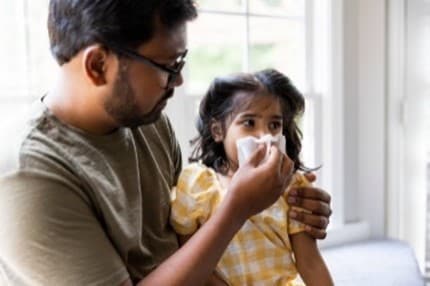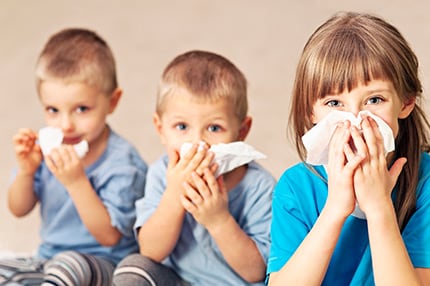Rhinoviruses
About

Rhinoviruses are the most frequent cause of the common cold. In the United States, children have an average of two rhinovirus infections each year, and adults have an average of one. Most rhinovirus infections are mild, but they can cause severe illness, especially in people with weakened immune systems, asthma, or other underlying medical conditions. Rhinoviruses are commonly detected in children hospitalized for respiratory illness.
There are many different rhinovirus types. Rhinoviruses are part of the same virus group as Non-polio Enteroviruses, and have some similar properties to Enterovirus D68.
What time of the year are people most likely to get infected
Rhinoviruses usually occur year-round but tend to rise in early fall and spring. This is also when other respiratory viruses may circulate, such as Adenoviruses, Influenza, and RSV.
How Do They Spread
Rhinoviruses are spread through respiratory droplets that are released when an infected person coughs or sneezes. These droplets can enter another person’s body if they breathe them in, or if they touch a surface contaminated with the virus and then touch their eyes, nose, or mouth. Rhinoviruses can also be spread through close personal contact with an infected person, such as shaking hands or hugging.
What are the Symptoms
Many people will have no symptoms. Among those who develop symptoms, they typically last about 7 days but can last up to two weeks. Symptoms may include:
- Cough
- Sneeze
- Runny Nose
- Nasal congestion
- Sore throat
- Headache
- Body Aches
- Fever
More severe illness is less common but can include asthma exacerbations, bronchioliti middle ear infections, sinusitis, bronchitis, or pneumonia. These symptoms can mirror other respiratory infections.

How to Protect Yourself
You can reduce your risk of getting a rhinovirus by following these tips:
- Wash your hands for at least 20 seconds after you touch surfaces or objects that have germs on them. If soap and water are not available, use an alcohol-based hand rub. (See CDC’s Clean Hands Save Lives!).
- Avoid contact with people who are sick.
- Avoid touching your eyes, nose, and mouth with unwashed hands.
- Clean/disinfect objects and surfaces regularly (such as light switches, countertops, and doorknobs).
- Consider wearing a high-quality, well-fitting face mask. This might be especially useful in certain circumstances, for example, in household settings when someone is sick or in crowded indoor settings such as public transportation when respiratory disease activity is high in your community.

How to Protect Others
If you are experiencing symptoms of rhinovirus, follow these tips to help prevent spreading it to others:
- Stay at home while sick and keep children home from school or daycare if they are sick.
- Avoid close contact with others (hugging, kissing, or shaking hands).
- Cough and sneeze into a tissue then throw it away, or cough and sneeze into your upper shirt sleeve, completely covering your mouth and nose.
- Wash your hands often, especially after coughing, sneezing, or blowing your nose. If soap and water are not available, use an alcohol-based hand rub (See CDC’s Clean Hands Save Lives!).
- Disinfect frequently touched surfaces and objects, such as toys, doorknobs, and mobile devices.
Testing & Screening
Testing not typically done (doctors may perform PCR tests in special circumstances such as severe illness).
When to Test
Doctors may order testing for rhinovirus infection for persons with severe illness and in other unusual circumstances.
How to Treat
There is no vaccine, treatment, or medication to prevent or cure rhinoviruses. You should take the following actions:
- Drink plenty of fluids
- Get plenty of rest
You can use over-the-counter medicines (such as pain relievers and fever reducers) to lessen symptoms. In most cases, people get better on their own.
Contact your healthcare provider if you or your child’s symptoms are more severe than usual and go longer than 7 days.